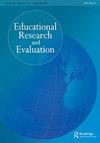Linking personality to teachers’ literacy in classroom assessment: a cross-cultural study
IF 3.3
Q1 EDUCATION & EDUCATIONAL RESEARCH
引用次数: 3
Abstract
ABSTRACT Educational assessment is a complex area of teacher professionalism involving negotiation of purposes and practices within sociocultural contexts. Developing teachers’ assessment literacy has thus become a priority across education systems. Additionally, student teachers’ assessment approaches and confidence in their assessment competence may be influenced by their personality and the prevailing educational cultures. This cross-cultural study on student teachers in Canada and Germany examined the relationship between personality traits and assessment literacy. Regression analyses revealed that self-rated assessment literacy was supported by sense of self-efficacy, suggesting that experiences of success in teacher education are important in developing assessment literacy. While summative approaches to assessment were not associated with personality, formative approaches were particularly influenced by personal values such as empathy and composure. Overall, the findings were fairly stable across the two educational contexts. Implications for teacher education in the field of assessment include an emphasis on leveraging student teachers’ values.课堂评估中人格与教师素养的联系:一项跨文化研究
摘要教育评估是一个复杂的教师专业领域,涉及社会文化背景下的目标和实践协商。因此,发展教师的评估素养已成为整个教育系统的优先事项。此外,师生的评估方法和对其评估能力的信心可能受到其个性和主流教育文化的影响。这项针对加拿大和德国学生教师的跨文化研究考察了人格特征与评估素养之间的关系。回归分析显示,自我效能感支持了自评评估素养,这表明教师教育的成功经验对发展评估素养很重要。虽然总结性评估方法与个性无关,但形成性评估方法尤其受到移情和沉着等个人价值观的影响。总体而言,研究结果在两种教育背景下都相当稳定。评估领域对教师教育的影响包括强调利用师生的价值观。
本文章由计算机程序翻译,如有差异,请以英文原文为准。
求助全文
约1分钟内获得全文
求助全文
来源期刊

Educational Research and Evaluation
EDUCATION & EDUCATIONAL RESEARCH-
CiteScore
3.00
自引率
0.00%
发文量
25
期刊介绍:
International, comparative and multidisciplinary in scope, Educational Research and Evaluation (ERE) publishes original, peer-reviewed academic articles dealing with research on issues of worldwide relevance in educational practice. The aim of the journal is to increase understanding of learning in pre-primary, primary, high school, college, university and adult education, and to contribute to the improvement of educational processes and outcomes. The journal seeks to promote cross-national and international comparative educational research by publishing findings relevant to the scholarly community, as well as to practitioners and others interested in education. The scope of the journal is deliberately broad in terms of both topics covered and disciplinary perspective.
 求助内容:
求助内容: 应助结果提醒方式:
应助结果提醒方式:


